AHREFs Background
Ahrefs is a robust suite of search engine optimization (SEO) tools. It’s a popular choice for many SEO agencies, pay-per-click (PPC) media agencies, and social media marketing firms. Ahrefs allows you to do keyword and content research, track your position on search engine result pages (SERPs), study overall site performance, conduct an SEO audit, generate content ideas, and is particularly useful when it comes to constructing and executing backlinking strategies.
AHREFs Features
Ahrefs’s features pivot around the following five tools.
Site Explorer
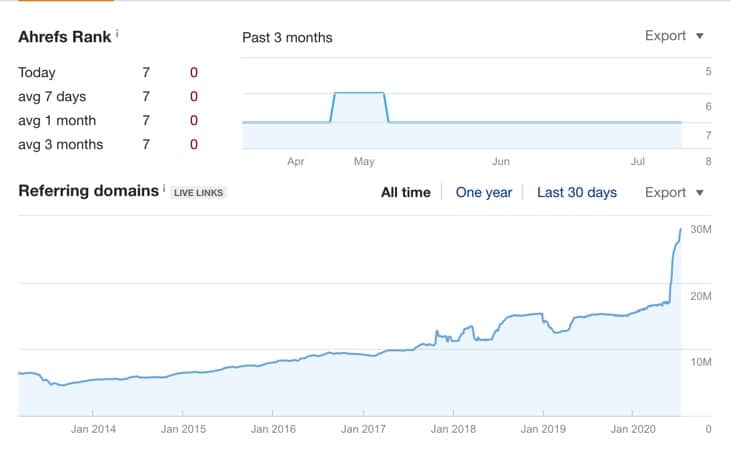
This gives you an overview of your website’s traffic and backlink situation.
- Organic Traffic Research: Discover which pages are moving the most traffic in your direction. Study the keywords your competition ranks for. Ahrefs studies over 150 million keywords in the US, and even more given that you can conduct research for over 150 countries. You can also find out which of your competitor’s pages is doing the best in terms of organic traffic, backlinks, and social media exposure.
- Backlink Checker: Get all the information about who’s linking to your competition. Ahrefs has a database of over 14 trillion links, so it’s able to deliver results quickly. You can also study a website’s outgoing link profile to more accurately craft your backlink strategy.
- Paid Traffic Research: See if your competition is doing PPC, and, if so, what their ad campaigns are like.
Keywords Explorer
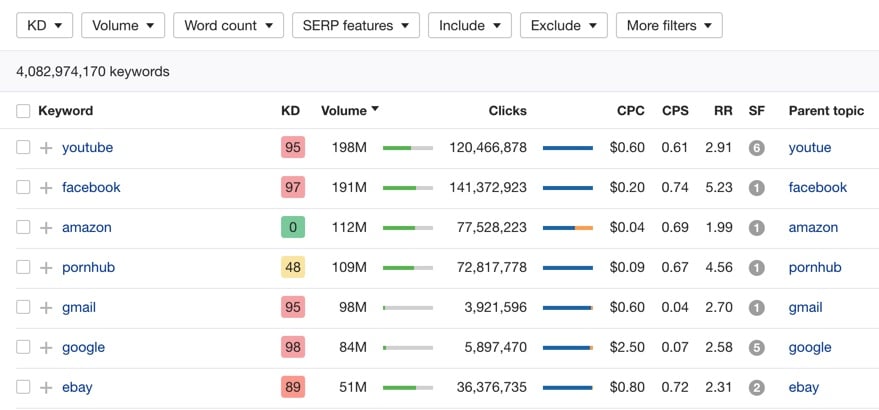
This keyword research tool allows you to find new keywords and most of the information you’d want on them.
- Keyword Research: Discover the following information about your keywords.
-
- Keyword Difficulty
- Search Volume
- Cost Per Click (CPC)
- Global Volume
- Return Rate: a measure of which keywords get the most repeat searches.
- Click Per Search
- Percentage of Clicks: See what percentage of searches lead to a click.
- Percentage of Paid Clicks: See what percentage of clicks come from paid searches.
- Parent Topic: See if you can rank for a particular keyword while also ranking for related keywords as well.
- Check SERPs: See the search engine result positions (SERPs) for the websites that do best for any given keyword.
- SERP Position History: See the ranking history of the domains that are currently the top five SERPs.
- Keywords Suggestions: See how your keywords behave when they’re in the following contexts:
-
- Phrase Match: Phrases your keyword appears in.
- Have the Same Terms: Searches that have all the words in your keyword in any order.
- Also Ranks For: Discover other keywords that top-ranking pages also rank for.
- Questions: Searches that take the form of questions.
- Keyword Difficulty Score: This lets you know, using a scale of 1 to 100, how likely your page is to be among the top 10 SERPs.
- 10 Search Engines: Get results for 10 search engines:
-
- Amazon
- YouTube
- Bing
- Yahoo
- Yandex
- Baidu
- Daum
- Naver
- Seznam
- Save Keywords: Create keyword lists so you can revisit your searches later.
SEO Audit Tool
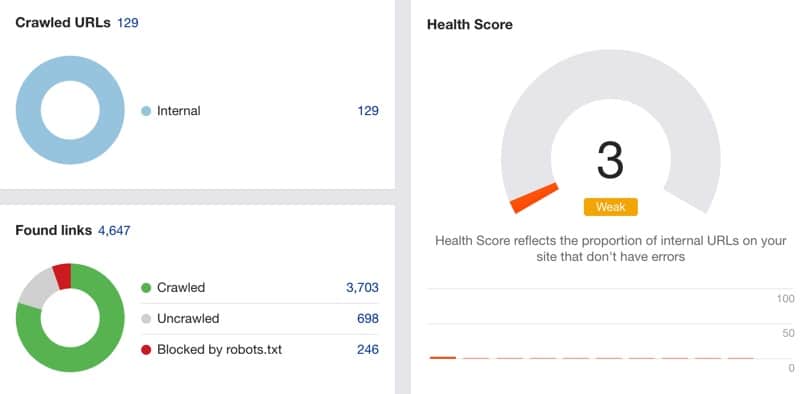
This is Ahref’s version of a tool you can also find on Ubersuggest and SEMrush. Discover how well your website does on over 100 SEO best practice metrics.This includes:
- Page Speed: How quickly pages load.
- Tags: Every issue you may run into with your tags.
- Content: Low word count, duplicate content, etc.
- Outgoing Links: Seeing which of the links you link to are broken, redirects, etc.
- Resources: Faulty images, JavaScript, CSS, and more.
- Mobile: A set of metrics just to measure the quality of your site on mobile devices.
Rank Checker
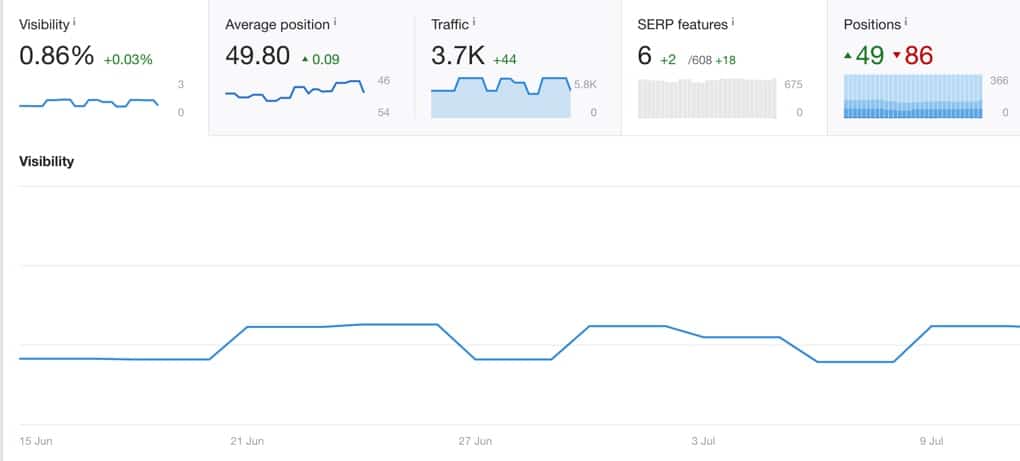
This is a SERP tracking tool similar to SERPROBOT although more robust. It keeps you abreast of your rank on SERPs on desktop and mobile devices. You get the following options.
- Countries: Select which countries to track your SERPs in, with 170 countries to choose from.
- Visibility: See the number of people who click on your site when it’s a result expressed as a percentage.
- Average Position & Traffic: Get a graph of how much traffic you’re getting on average.
- Positions Distribution: See where you fall when the results are broken up into groups: #1–3, #4–10, #11–50, and #51–100.
- SERP Features: See if any of your pages appear in 13 different features. You can also track the history of your appearances in the following features:
-
- Adwords top
- Adwords bottom
- Featured snippet
- Image pack
- Knowledge card
- Knowledge panel
- People also ask
- Sitelinks
- Shopping results
- Thumbnails
- Top stories
- Tweet box
- Vides
- Track Competitors: Track upwards of 10 competitors. See their changes in rank, search traffic, and their appearances in SERP features.
- Track Shares of Traffic: See how you stack up against the top 100 domains that are sharing the traffic for any given keyword.
- Automated Reports: Get detailed reports sent to your email.
Content Explorer

This tool allows you to study the content that people are producing for your niche.
- Track Content: Find the content that’s performing best for a given keyword. Sort by:
-
- Monthly organic traffic.
- Domain authority.
- Number of backlinks.
- Cost of organic traffic if it’s gained by PPC.
- How many times the content has been shared on Facebook, Twitter, and Pinterest
- Advanced Search Option: Discover the most popular content for searches made out of complex terms. Ex.: (PPC or “backlinks”) AND “graphs”.
- Sort By: Arrange the order of your results using the following 12 filters:
-
- Author
- Domain Rating
- Language
- Live / Broken
- Number of words
- Organic traffic
- Published / First published date
- Published once / Republished
- Referring domains
- Site
- Social shares
- Traffic value
- Visualizations: Embedded charts let you quickly see the changes a particular page makes in terms of backlinks and organic traffic over time.
- Find Broken Links: Discover if any given piece of content has broken links.
- Study Publishing Schedules: See how often and when a given domain is publishing or republishing content.
- Discover Which Sites Aren’t Linking to You: Search by topic to discover which websites aren’t linking to your domain.
- Find Unlinked Mentions: Search for your brand name and find out if you’re getting any unlinked mentions.
- See Content Trend History: See the number of pieces published about a given topic over time.
How It’s Used

Ahrefs is intuitively designed. All you have to do is enter the topic, keyword, or domain you want to research. A subscription also comes bundled with learning materials, and access to the Ahrefs community and tech support. Ahrefs is also populated by popup info windows that you can activate by scrolling over an “i” button. Lastly, Ahrefs has an easy to use help chat that will get your questions answered pretty quickly.
AHREF Use Cases
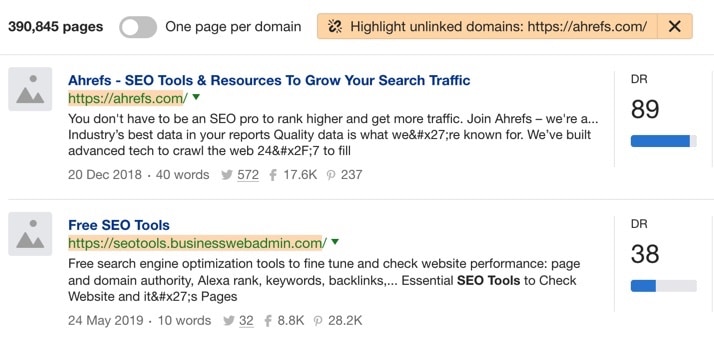
Find Broken Links:
If you’re able to find a piece of content’s broken links you can contact the owner and suggest your own version of that content as the new linked-to piece. It may even be worth it to write that content yourself if a link in the article is important enough.
Discover Which Sites Aren’t Linking to You:
Similarly, you can suggest your content to pages that cover your niche.
Percentage of Clicks:
Knowing where you place on SERPs is helpful, but it’s even more helpful to know your SERP position and how often people actually click your link. You may find that a SERP position doesn’t necessarily translate into more clicks and, as a result, tweak your SEO strategy to target the keywords that lead to more clicks.
Knowing the number of clicks you get is also helpful because Google now answers many questions as a feature, making clicking a link unnecessary in many cases. With this in mind, you can tweak your content to focus on queries that don’t have a featured result. Ahrefs also gives you a snippet of the text around the links on the SERPS you’re looking at, so you get a clearer idea of why people are clicking.
SERP Profile:
See the backlinks, organic traffic, and organic keywords for top SERP pages. This way you can see what about a particular page is impacting its rank. You can use that information to inform your own strategy to improve your rank.
Study Publishing Schedules:
If you know when a popular site is going to be publishing its content you can be prepared in advance to join the conversation. If you also know who on the team engages with comments on social media, you can be among the first to engage and increase the likelihood of being retweeted, talk with the influencer, and have more people see your brand if they’re reading comments.
AHREFs Pricing
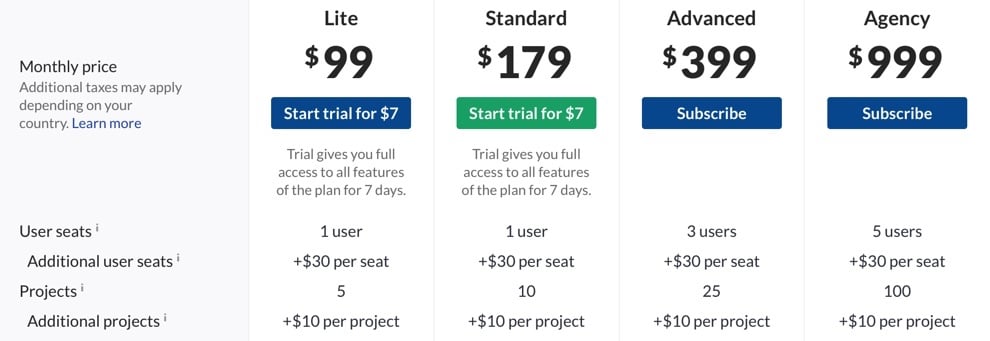
Ahrefs gives you a week-long trial for $7. You also get two months free if you sign up for a yearly subscription. Ahrefs is comparable in cost to SEMrush, although the published cost of adding new users for Ahrefs is $30 as opposed to the $200 per user for SEMrush.
Bottom Line on AHREFs
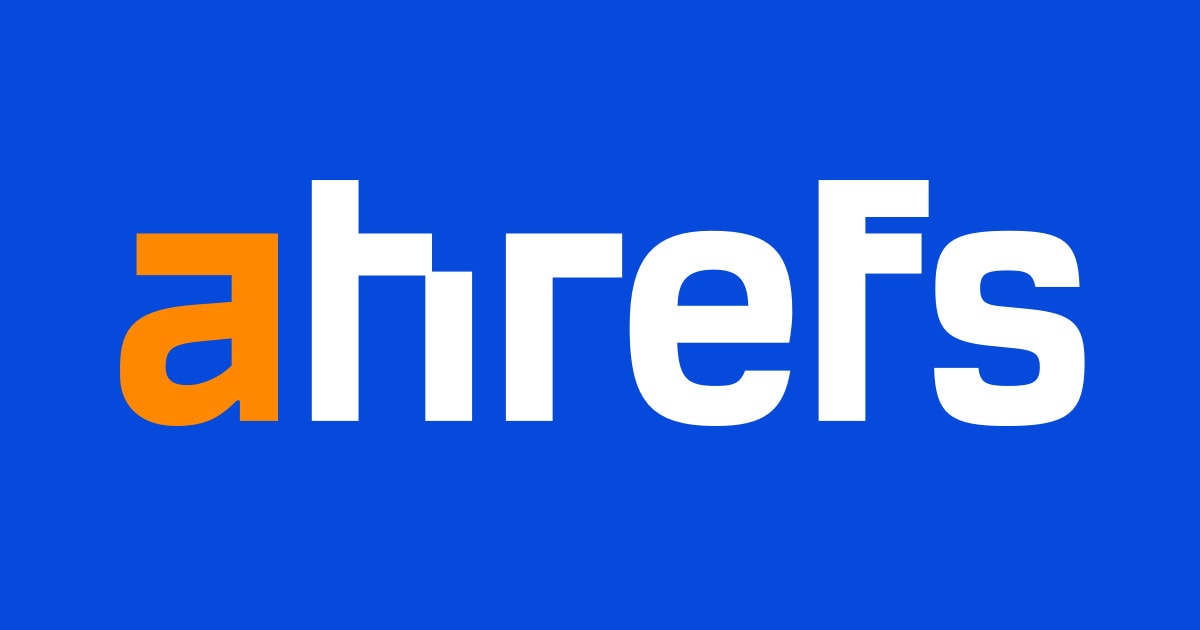
Ahrefs is not as robust as its closest competitor, SEMrush, but that doesn’t mean that you should just ignore Ahrefs. At the end of the day, the choice you make should be informed by what you’re going to be using your suite for. Ahrefs, for example, doesn’t have a tool kit dedicated to PPC, while SEMrush does. Ahrefs, however, can be used more efficiently for backlink research, which makes sense since it was originally solely a backlinking tool.
Many social media marketing agencies, PPC media agencies, and SEO agencies also have a subscription to both SEMrush and Ahrefs because of how well the two complements each other. Because Ahrefs is less robust, it makes use easier in many cases. You can see the most important data right away. But SEMrush’s power is unmatched and allows you to conduct more in-depth research. So, you don’t really have to choose between the two if it’s not cost-prohibitive to subscribe to both.







